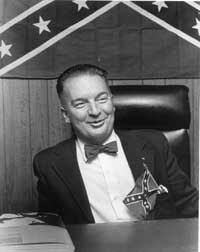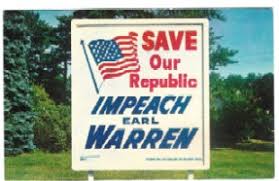Conservative Federalist Society Can Expect Its Status to Shrink
By Robert Barnes
Washington Post
November 21, 2008
Last year, there was a candlelight dinner at sold-out, shut-down Union Station to celebrate the 25th anniversary of the Federalist Society, with President Bush on stage and three Supreme Court justices in the audience. This year, it’s "welcome to the wilderness," as a former Clinton administration appointee good-naturedly told the group of lawyers yesterday at its annual meeting. William P. Marshall, a former deputy White House counsel for President Bill Clinton who teaches law at the University of North Carolina at Chapel Hill, promised to share survival tips after his party’s eight-year absence from power.
During that time, the conservative legal organization served as a catalyst for Bush’s efforts to change the federal judiciary. But the group now finds itself sorting through the role it should play in scrutinizing President-elect Barack Obama’s forthcoming efforts to bring about a similar change of his own…
Federalist Society executive vice president Leonard A. Leo laughed when asked about the wilderness remark, saying, "I know the media likes to talk about us in terms of power and influence." But he said the group’s primary goal has always been discussion of legal interpretation and limited constitutional government, and that that "remains as important as it was on November 3rd." The organization has always believed that the promotion of judges who share its conservative views is the most lasting way to enshrine its principles, and it has been extremely successful. The liberal Alliance for Justice estimates that 46 percent of Bush’s appointments have ties to the Federalist Society…
At one of the group’s events last month, Bush bragged that he has appointed more than a third of the federal judiciary that will be in place when he leaves office. While he has appointed slightly fewer appeals court judges than Clinton — 61 to 65 — Bush’s mostly young appointees will soon make up nearly two-thirds of the judges at that level, and Republican-appointed judges are in the majority on 10 of the 13 circuits…
 I exhumed this article from 6 months ago because it has some guesses about numbers – numbers of judges appointed by George W. Bush under the watchful eye of the Federalist Society. The society was begun by a group including Edwin Meese, Robert Bork, Ted Olson and Steven Calabresi, and its members have included Supreme Court justices Antonin Scalia, John Roberts, Jr. and Samuel Alito. All of these individuals are conservatives, and nearly all have served in Republican administrations. The Society looks to Federalist Paper Number 78 for an articulation of the virtue of judicial restraint, as written by Alexander Hamilton [cite]:
I exhumed this article from 6 months ago because it has some guesses about numbers – numbers of judges appointed by George W. Bush under the watchful eye of the Federalist Society. The society was begun by a group including Edwin Meese, Robert Bork, Ted Olson and Steven Calabresi, and its members have included Supreme Court justices Antonin Scalia, John Roberts, Jr. and Samuel Alito. All of these individuals are conservatives, and nearly all have served in Republican administrations. The Society looks to Federalist Paper Number 78 for an articulation of the virtue of judicial restraint, as written by Alexander Hamilton [cite]: "It can be of no weight to say that the courts, on the pretense of a repugnancy, may substitute their own pleasure to the constitutional intentions of the legislature…. The courts must declare the sense of the law; and if they should be disposed to exercise WILL instead of JUDGMENT, the consequence would equally be the substitution of their pleasure to that of the legislative body."
 The Federalist Society was founded in 1982, not long after the election of Ronald Reagan. It is the Federalist Society that John Yoo was referring to yesterday when he said, "But conservatives should not be pleased simply because Sotomayor is not a threat to the conservative revolution in constitutional law begun under the Reagan administration" as the conservative revolution in constitutional law.
The Federalist Society was founded in 1982, not long after the election of Ronald Reagan. It is the Federalist Society that John Yoo was referring to yesterday when he said, "But conservatives should not be pleased simply because Sotomayor is not a threat to the conservative revolution in constitutional law begun under the Reagan administration" as the conservative revolution in constitutional law.  What is this powerful organization about? Throughout the post-war years, the Supreme Court made a number of sweeping decisions in our interpretation of the Constitution – for example: Brown v. The Board of Education; Miranda v. Arizona; Roe v. Wade. For people like me, this was a golden age in which the Supreme Court finally made good on the promises of equality and civil rights that were already in our Constitution, but not in our American life. But for many, this was seen as "legislating from the bench." These people are "originalists" who believe in interpreting the Constitution as those who actually wrote it originally thought of it.
What is this powerful organization about? Throughout the post-war years, the Supreme Court made a number of sweeping decisions in our interpretation of the Constitution – for example: Brown v. The Board of Education; Miranda v. Arizona; Roe v. Wade. For people like me, this was a golden age in which the Supreme Court finally made good on the promises of equality and civil rights that were already in our Constitution, but not in our American life. But for many, this was seen as "legislating from the bench." These people are "originalists" who believe in interpreting the Constitution as those who actually wrote it originally thought of it.  An apt analogy would be the fundamentalists interpretation of the Bible or the Quran. If Mark says, "Take up serpents," they handle snakes. If the Quran says jihad, literal jihad with scimitar in hand it will be. So the Federalist Society has and will continue to roll back equal opportunity, civil rights, any modern elaboration of the promises of the Constitution.
An apt analogy would be the fundamentalists interpretation of the Bible or the Quran. If Mark says, "Take up serpents," they handle snakes. If the Quran says jihad, literal jihad with scimitar in hand it will be. So the Federalist Society has and will continue to roll back equal opportunity, civil rights, any modern elaboration of the promises of the Constitution.
The Vesting Clause of Article II provides that "[t]he executive Power [of the United States] shall be vested in a President of the United States of America." Proponents of the unitary executive theory argue that this language, along with the Take Care Clause ("The President shall take care that the laws be faithfully executed…"), creates a "hierarchical, unified executive department under the direct control of the President."The general principle that the President controls the entire executive branch was originally rather innocuous, but extreme forms of the theory have developed. John Dean explains: "In its most extreme form, unitary executive theory can mean that neither Congress nor the federal courts can tell the President what to do or how to do it, particularly regarding national security matters"…
Proponents of a strongly unitary theory argue that the President possesses all of the executive power and can therefore control subordinate officers and agencies of the executive branch. This implies that the power of Congress to remove executive agencies or officers from Presidential control is limited. Thus, under the strongly unitary executive theory, independent agencies and counsels are unconstitutional to the extent that they exercise discretionary executive power not controlled by the President…
I’d guess they are from the same kind of flawed fabric that even John Adams draped himself in. If I read it at all correctly, at the root of things was a fundamental distrust of democracy…the mass of the unwashed participating – in an active sense – in the important matters of state? Certainly undesirable and probably unthinkable. It’s the same crowd that wished fervently to have adorned the Presidency of the United States with all the trappings of monarchical power including the flim-flam and flummery that would placate the masses and keep the ship of state firmly in the hands of those who know best how to sail it. Thus, we get Alien & Sedition, Patriot and cetera from time to time when Federalist types find themselves close on to the levers of power. I’d bet Tom Jefferson would understand perfectly if every one of these jeezly sons a bitches were rounded up and packed off to Idaho where they could play footsie bathroom games with Larry Craig. They’re all perverts in addition to being all screwed up on what America is about.
Thanks, Mickey, as always, for the cathartic opportunity.